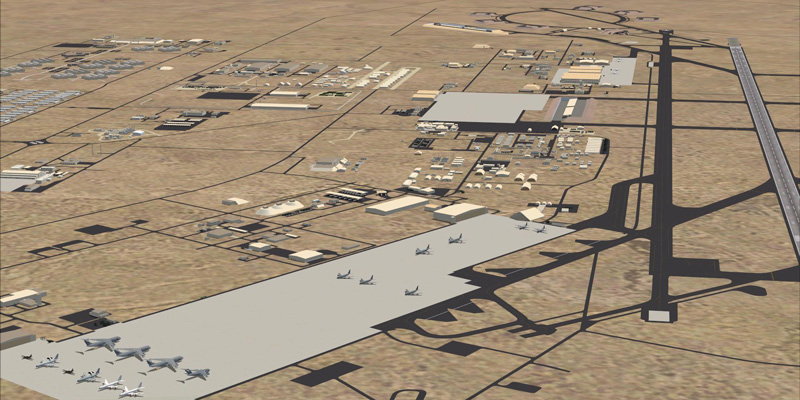I’m now in the midst of researching the American policy discussion about the future of Al-Udeid Air Force Base in Qatar, home to the largest concentration of American military personnel in the Middle East. It hosts more than 11,000 U.S. forces, the forward headquarters of the U.S. Air Force Central Command, the Combined Air and Space Operations Center, and the 379th Air Expedition Wing. It is the also the “Combined Air and Space Operations Center” from which the U.S. has been coordinating its air strikes against ISIS in Iraq, Syria, and Afghanistan. Amid the diplomatic crisis between Qatar on the one hand and Saudi Arabia, the UAE, Bahrain, and Egypt on the other, a variety of voices have debated how a substantial U.S. army presence in Qatar may be affecting the crisis.
 The forthcoming paper is part of a series that has also included a publication about the new Chinese and Saudi bases in Djibouti. Among other aspects of the research, I’m gathering statements about the matter by current and former American officials and other public voices. Below is a list of what I’ve found so far. I welcome any additional quotes which colleagues might have come across.
The forthcoming paper is part of a series that has also included a publication about the new Chinese and Saudi bases in Djibouti. Among other aspects of the research, I’m gathering statements about the matter by current and former American officials and other public voices. Below is a list of what I’ve found so far. I welcome any additional quotes which colleagues might have come across.
I. Official statements about the possibility of relocating the American base at Al-Udeid
- On July 12, the Christian Broadcasting Network (CBN) aired an interview with President Donald Trump in which the Qatar crisis was discussed. In response to a question about the future of the Al-Udeid base, he said, on the one hand, “We are going to have a good relationship with Qatar. We are not going to have problems with the military base.” On the other hand, he said, “If we ever needed another military base, you have other countries that would gladly build it. … If we ever have to leave, we would have ten countries willing to build us another one, believe me, and they will pay for it.”
- On July 17, in the U.S. Armed Forces-affiliated Military Times magazine, Pentagon spokesman Navy Captain Jeff Davis said that while the U.S. continues to make full use of Al-Udeid Air Base, it has considered alternatives in case the Qatar rift escalates. “I think any time you are doing military operations,” he said, “you are always thinking ahead to Plan Bs and Plan Cs … We would be remiss if we didn’t do that. [But] in this case, we have confidence that our base in Qatar is still able to be used.
II. Statements critical of the U.S. military presence at Al-Udeid by former senior U.S. officials and other opinion leaders in Middle East policy
- Before the onset of the Qatar crisis, on May 23, 2017, former U.S. Defense Secretary Robert Gates appeared as the keynote speaker at a conference of the Foundation for Defense of Democracies on “Qatar and the Muslim Brotherhood’s Global Affiliates: New U.S. Administration Considers New Policies.” Among other comments, Gates said that while Qatar is a military ally, the U.S. should consider moving Al Udeid airbase if the Gulf country does not become “aggressive and unambiguous in their willingness to take on the terrorism problem.” Gates’s statement was subsequently attacked by advocates for the Qatari government, after the release of hacked e-mails between Gates and Yusuf Otaiba, former UAE ambassador to Washington. In that correspondence, one day before the FDD conference, Gates spoke of the opportunity FDD was granting him to “put some folks on notice.” Otaiba replied to Gates’s e-mail with the statement, “MBZ sends his best from Abu Dhabi. He says ‘give them hell tomorrow’.”
- At the same FDD conference, Congressman Ed Royce (R-California), head of the House Committee on Foreign Relations, echoed Gates’s sentiment. He asserted that Congress was prepared to explore moving the Qatar base to another location in the region if Doha did not change its policies, particularly with respect to the Muslim Brotherhood. “I think if behaviors didn’t change there would absolutely be a willingness to look at other options for basing,” he said.
- On a television interview on FOX News in early July 2017, former senior Middle East envoy Dennis Ross said, “They won’t kick us out because the reason they allow us to use the base is because they see it as a not so subtle indication that the United States is providing a security guarantee to them. That gives them an assurance and a license to do what they’re doing and on the other hand … I think the key here is that we need to be the ones communicating to them that we won’t continue to use this base and that we’ll be prepared to look for and develop alternatives. They want this as a source of security. They need to understand unless they change their ways, they’re putting that (the base) at risk.” Asked whether he thinks Qatar is prepared to change its foreign policies, Ross said: “Only if they see that the real cost with us is one that begins with us raising questions about their security as they define it”.
III. Statements critical of the U.S. military presence at Al-Udeid by lesser known figures
Marginal voices in the court of public opinion, typically consultants paid by corporations and/or governments,. have also argued for moving the base.
- On July 18, an article was published in The Federalist magazine titled “Why It’s Time to Remove the United States’ Air Base from Qatar.” He paraphrased Dennis Ross as noting that the U.S. military base serves the Qataris as a “security guarantee to do whatever they like.” He added, “Some might argue that closing Al-Udeid would mean losing a strategically located base, but the U.S. military is more than capable of making up for it with capacities in Bahrain, the UAE, and elsewhere in the region.”
IV. Statements in defense of the U.S. military presence at Al-Udeid by former senior U.S. officials and other opinion leaders on Middle East policy
- At the same May 23 conference of the Foundation for the Defense of Democracies in which Robert Gates appeared, another guest was Jake Sullivan, former national security advisor to Vice President Joe Biden. By contrast to Gates’ suggestion to move U.S. armed forces out of Qatar, Sullivan is reported to have “maintained that it would be imprudent to remove the Al Udeid airbase altogether, but rather we should call out our allies publicly to maintain a sustainable order and effective partnership with Qatar.”
Request for more
If you have come across other statements about the matter, I’d be grateful to hear from you via this contact form.

Speak Your Mind